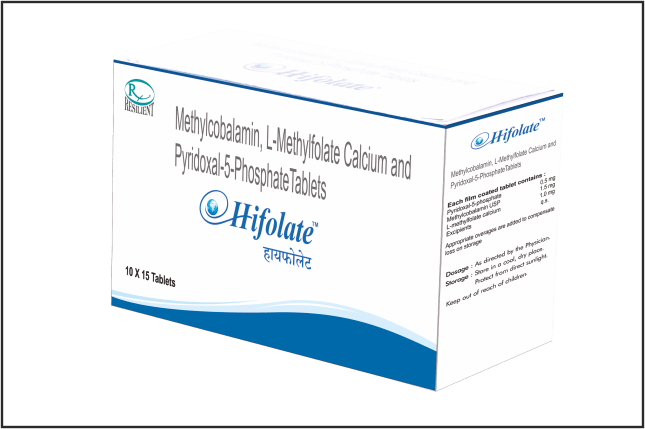Pregnancy is a crucial time in a woman’s life, and proper nutrition is essential for both the mother and the growing fetus. Folic acid is a critical nutrient that plays a crucial role in the development of the neural tube in the fetus. However, many women may not get the recommended amount of folic acid from their diet alone. In such cases, doctors may recommend taking Hifolate tablets during pregnancy to ensure adequate folic acid intake. This article will discuss the uses, side effects, and FAQs related to Hifolate tablet use in pregnancy.
What are Hifolate Tablets?
Hifolate is a prescription medication containing a combination of folic acid, methylcobalamin, and pyridoxine. Folic acid is a B-vitamin that is crucial for proper cell growth and development, especially during pregnancy. Methylcobalamin is a form of vitamin B12 that helps in the production of red blood cells and the maintenance of the nervous system. Pyridoxine is also a B-vitamin that is involved in the metabolism of amino acids and the production of neurotransmitters.
Uses of Hifolate Tablets in Pregnancy
Hifolate tablets are primarily prescribed during pregnancy to prevent birth defects of the brain and spine, collectively known as neural tube defects. The neural tube is the embryonic structure that develops into the brain and spinal cord. Proper development of the neural tube is essential for the normal functioning of the nervous system. However, if the neural tube does not close correctly, it can result in birth defects such as spina bifida and anencephaly. Studies have shown that taking folic acid supplements before and during pregnancy can significantly reduce the risk of neural tube defects.
Hifolate tablets are also prescribed for women who are at high risk of having a baby with a neural tube defect, such as those with a personal or family history of neural tube defects or certain medical conditions that increase the risk of these defects.
Side Effects of Hifolate Tablets in Pregnancy
Hifolate tablets are generally safe and well-tolerated by most women. However, as with any medication, there may be some side effects. The most common side effects of Hifolate tablets include:
- Nausea
- Vomiting
- Diarrhea
- Abdominal pain
- Headache
- Skin rash
These side effects are usually mild and go away on their own. However, if they persist or become severe, you should consult your doctor.
In rare cases, Hifolate tablets can cause an allergic reaction. Symptoms of an allergic reaction may include:
- Swelling of the face, lips, tongue, or throat
- Difficulty breathing
- Rash or hives
- Itching
If you experience any of these symptoms, seek immediate medical attention.
FAQs about Hifolate Tablets in Pregnancy
Is it safe to take Hifolate tablets during pregnancy?
Yes, Hifolate tablets are generally safe to take during pregnancy. However, you should only take them if your doctor prescribes them.
When should I start taking Hifolate tablets during pregnancy?
Ideally, you should start taking Hifolate tablets at least one month before you conceive and continue taking them throughout your pregnancy.
How much folic acid do I need during pregnancy?
The recommended daily dose of folic acid during pregnancy is 600-800 micrograms. However, your doctor may prescribe a higher dose if you are at high risk of having a baby with a neural tube defect.
Can I get enough folic acid from my diet alone?
While it is possible to get some folic acid from food sources such as leafy green vegetables, fruits, nuts, and beans, it can be challenging to get the recommended daily intake from diet alone. Therefore, taking a folic acid supplement such as Hifolate tablets may be necessary to ensure adequate intake.
Are there any foods or drinks that I should avoid while taking Hifolate tablets?
There are no specific foods or drinks that you need to avoid while taking Hifolate tablets. However, you should avoid alcohol as it can interfere with the absorption of folic acid and may harm the developing fetus.
Can Hifolate tablets interact with other medications?
Hifolate tablets may interact with certain medications, such as those used to treat seizures or tuberculosis. Therefore, it is essential to inform your doctor about all the medications you are taking, including over-the-counter medicines and herbal supplements.
Conclusion
In conclusion, Hifolate tablets are a safe and effective way to ensure adequate folic acid intake during pregnancy. Folic acid is crucial for the proper development of the fetal nervous system and can significantly reduce the risk of neural tube defects. While Hifolate tablets are generally well-tolerated, it is essential to be aware of potential side effects and seek medical attention if necessary. As with any medication, it is crucial to follow your doctor’s instructions and inform them of any other medications or supplements you may be taking. By taking Hifolate tablets as prescribed, you can help ensure a healthy pregnancy and a healthy baby.
